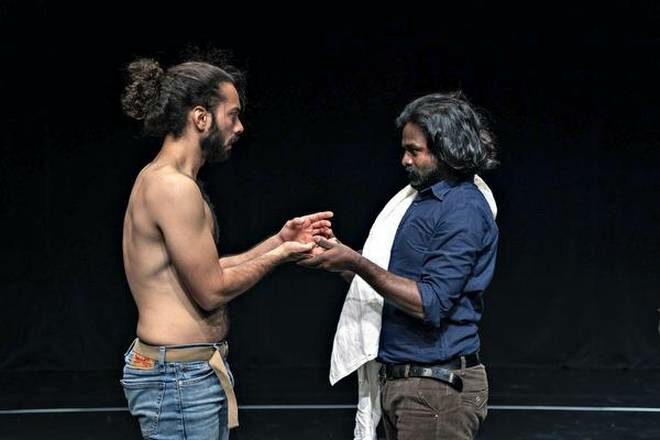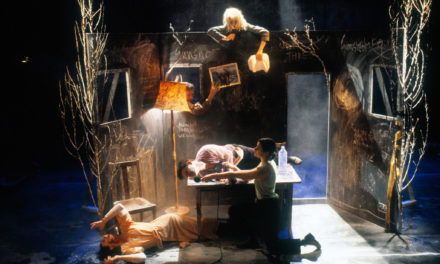One of India’s emergent theatre-makers, and also a young veteran when it comes to acting legs, the Delhi-based Anirudh Nair, or simply “Rudy” in theatre circles, has been stationed in Mumbai this month. Next week, in what is his first open facilitation in the city, he conducts a five-day performer training workshop. This follows a month-long teaching stint at the Drama School Mumbai (DSM) where he taught body movement and improvisation to a batch of twenty students in semi-weekly classes. Popular in the classroom for his dynamic techniques and unbounded energy, Nair is one of a long line of practitioners-turned-pedagogues, who are giving back to a community of makers what they’ve themselves received as learning from their own teachers and mentors. At DSM, the stress is often on the internationally trained, and in this regard, Nair comes armed with excellent credentials.
Collaborative Spirit
At the University of Exeter, circa 2008, he studied form-based theatre methodologies under masters like Phillip Zarrilli, internationally renowned for his psychophysical processes that harness Asian martial and meditation arts. “It was surreal, I found myself as an Indian student in southwest England being taught basically Asian forms by a Jewish American professor,” recalls Nair. Later, with director Anna-Helena McLean, Nair undertook a series of training programs in physical theatre with a decidedly Eastern European outlook. Their ‘self-directed’ collaborative atmosphere has contributed much to the processes Nair has now established in his own burgeoning practice.
His recent directorial outings with Guild of the Goat, the theatre company he founded with co-conspirators Amba Suhasini K. Jhala and Pranay Manchanda, include Sonnets c 2019 (the year in the title is incremented annually) and Contempt, a co-production with Oddbird Theatre and Foundation and the Tadpole Repertory. These works are considered and contemplative and display both aesthetic and moral persuasions. They are not lacking in technical presentation, or the power of conviction or intent, or in the assemblage of talent. While eschewing the sophistry and superficial polish so entrenched in urban theatre, Nair exhibits an ensemble-based exploratory style that is still grappling to find the right cultural coordinates, but it’s a journey in which audiences are very much co-passengers. Based on Shakespeare’s eponymous love poems, Sonnets is a site-specific work that changes with each iteration, and the transmission of actors’ energies is vital to its success. On the other hand, Contempt, based on the play by Danish Sheikh, was conceived in a special collaborative ethos, where an entire team of makers became equal stake-holders—perhaps in keeping with the intersectional material at their disposal—the backdrop being the legal struggle for gay rights in the country.
With the Tadpole Repertory, Nair co-directed (with Neel Chaudhuri) a riotous adaptation of William Shakespeare’s The Winter’s Tale; and with director Sankar Venkateswaran, he and fellow-actor Chandra Ninasam collaborated on the documentary piece Criminal Tribes Act. “I had worked with Sankar on The Water Station, which was an essentially physical exploration. In this, we sat and brainstormed. The process wasn’t driven by the body,” remembers Nair.
A Shared Vocabulary
What is common to the set-ups Nair submits himself to as an actor or director, is a shared vocabulary with his collaborators, either borne out of training – for instance, Venkateswaran also studied under Zarrilli — or sensibility. While as an actor, he works mostly in English, both Sonnets and Contempt are multi-lingual projects. “Language is never a compromise for me, I enjoyed working on the translations that were a part of Sonnets’ making,” he says. Most important of all for Nair is the organic impulse that might propel him headlong into a project, and it is here that he comes across as a perennial learner still looking inward for answers, “I’m getting more and more strict in terms of asking why I want to make a particular piece of theatre.”
Nair had once penned a viral essay on being essentially ‘led on’ by the makers of Bhaag Milkha Bhaag, the biopic based on the Flying Sikh. He’d put in air-miles (both international and domestic) out of his own pocket and hours of athletic training, before being pipped at the post by a purportedly more saleable star. With his present accomplishments in the niche but no less powerful world of live performance, that memory is probably just a blip on the radar. While film stars ebb in accordance with their designated shelf-lives, Nair is only just coming into his prime.
The writer is a playwright and stage critic.
This article was originally published on The Hindu on July 27, 2019. Reposted with permission. Read the original article.
This post was written by the author in their personal capacity.The opinions expressed in this article are the author’s own and do not reflect the view of The Theatre Times, their staff or collaborators.
This post was written by Vikram Phukan.
The views expressed here belong to the author and do not necessarily reflect our views and opinions.


















